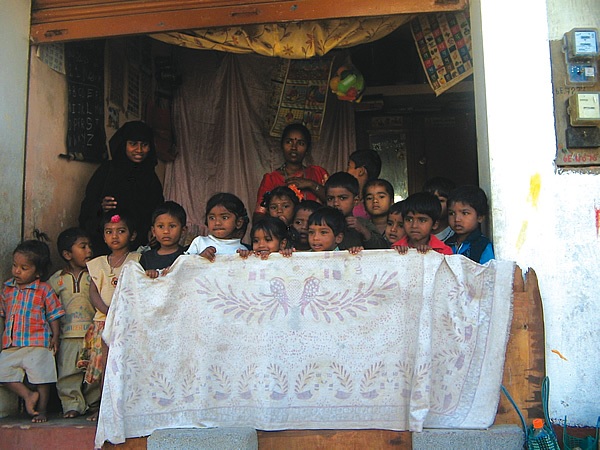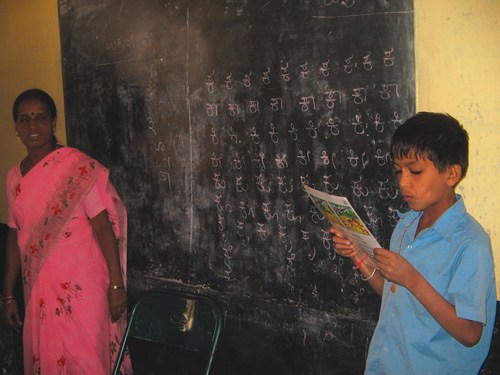Work Towards a Career in International Development Work
Article and Photos by Caryn Sweeny

|
|
Children in a balwadi (preschool) in Bangalore, India pose for photos. Many NGOs work with children either through health programs or as part of programs aimed at helping countries improve their education systems.
|
As a study abroad student and later adviser, I encountered students whose ideals of international careers were as varied as the countries they set off to. The majority, however, fell into two camps: the wanna-be jetsetters,
who would embark on glamorous careers in the corporate world; and the idealists, who planned on living in righteous poverty as they helped eradicate disease, illiteracy, and despair.
Fortunately, one doesn’t have to be Angelina Jolie or a Peace Corps volunteer in order to work and make a living internationally. There are scores of nonprofit, international, and non-governmental organizations (NGOs)
around the country (and world) seeking employees that are educated, culturally competent, and able to work collaboratively and as equals with locals on everything from HIV/AIDS prevention to water management education. The organizations vary
from small community-based offices to organizations with locations and staff on six continents. Because these organizations are funded through government agencies, religious organizations, philanthropic organizations, and corporate social responsibility
departments, they can offer competitive salaries and generous benefits. They may not pay as well as the corporate sector, but you’ll be able to pay off your student loans and eat more than ramen noodles while making a difference and see
the world.
Based on tips from colleagues and friends in many of these organizations, the following is a do and don’t list for breaking into, and succeeding in, an international NGO career.
► Do develop one or two regional foci as early as undergraduate studies. Developing an expertise in Francophone West Africa or Central
Asia will make you much more lucrative to organizations that work in those areas.
► Do study the rest of the world, too. There are lots of other places on the globe and sometimes, an organization just wants evidence
of your ability to understand current issues in a global context.
► Do volunteer or intern for local internationally focused organizations. World Affairs Councils, refugee groups, cultural societies,
and activist organizations are all good choices for starting your network. You may be the one who makes and presents the name tag for the French Ambassador to the United States before a function, and he may be delighted to hear about your recent
study in Grenoble and introduce you to his wife, who is on the board of an organization that is hiring….
► Do study abroad. The options for study abroad are endless. Two weeks, six months, a year, in every location from England to Ecuador,
studying language, or sculpture, or the art of the deal. Where isn’t even as important as what you make of it while there. Overcoming the challenges of living and learning in a new culture will show prospective employers that you have good
adaptation and acclimation skills.
► Do pursue higher degrees. Masters and doctoral degrees aren’t essential for working internationally. But they do help build
your knowledge base in a particular region or issue, and they give you access to some of the most accomplished and talented folks through seminars, campus events, and conferences. Not to mention the benefits you’ll reap from studying and
socializing with international students and scholars. A little small talk and soon enough you’ll be at a fellow student’s apartment learning how to make pirogues or roll sushi while deepening your awareness of globalization or Japanese
culture.
► Don’t discount any experience. Are you a babysitter for your Colombian neighbor’s children? Do you spend every Friday
at your favorite Ethiopian restaurant? Did you skip the spring break mayhem for a day in Mexico to explore some inland ruins? Engage everyone in conversation and reflect on what you saw, heard, and felt. Becoming a cultural being is the first
step toward a successful international career of any type.
► Don’t be a complacent traveler. Research different ways for getting below the surface of a country before you go. In South
Africa, certainly, go on the township tour — but then also ask your guide privately if it would be possible to set up a visit to a hospital to visit and read to children, or to go to a school and answer questions about your home country for
a little while. Again, these experiences and how you relay them during job interviews may make the most impact on the person interviewing, and give you a shot over someone who is well-traveled but not well-lived.
► Don’t assume only experienced, older staff get sent on international assignments. Older, more experienced staff are often
weary of the field, particularly if they have children and families. Not to mention, as a junior to mid-level staffer, you’re a lot cheaper to send. In my first five years with my organization, I was sent to seven countries for work.
► Don’t forget you’ll still have to pay your dues. Paying dues is a common theme in the world of work, but that doesn’t
mean there aren’t ways to pay them faster. Volunteer early and often for grunt work. If your organization hosts foreign dignitaries or high-level international workers, volunteer to stay late to guide guests to the venue or to put together
materials. Finally, learn as much as you can about the regions in which you want to work. Seek out those around you who work in those areas, and talk about current events and issues. When they need some help, they’ll think of you.
► Don’t forget language skills. Foreign language skills can be a critical tool in working with other cultures rather than just
in other cultures. But if you are a researcher, or a manager, or a provider of technical assistance, the language skills may be secondary. You’ll likely have a locallybased colleague who can help you with translation. However, you’re
not off the hook: learning some basics of the local language will not only show your respect for the people you’ll work with; it can also be a wonderful icebreaker as you struggle with each other’s languages!
For many, making a living in the NGO world is the happy medium between working for a multinational corporation and working in voluntary poverty (both of which are fine and noble callings on their own, if that’s your
preference). There are drawbacks, from being at the whims of donors and governments, to long overtime hours, to non-profit salaries, to red tape, but at the heart of many of these organizations is a belief in participatory and collaborative development.
Those who work with NGOs know that people around the world are capable of solving their own problems if they are provided with the means, tools, and expertise to do so. By working in the NGO world, you become one more asset in this fight.

|
|
A child in Bangalore, India practices reading as his teacher looks on.
|
Resources to Work for International NGO's
Where to Work?
Washington, D.C. and New York City are the obvious locations for U.S.-based NGO careers, but they aren’t the only options! Atlanta, Boston, San Francisco, and Seattle are a few other American cities with a visible international
NGO presence.
International NGOs
Habitat For Humanity works in partnership with people everywhere, from all walks of life, to develop communities with people in need by building and
renovating houses.
Save the Children is the leading independent organization creating real and lasting change for children in need in the United States
and around the world.
International Rescue Committee provides relief, protection, and resettlement services for refugees and victims of oppression or violent conflict.
Accion International gives people the tools they need to work their way out of poverty by providing “micro” loans
and business training to poor women and men who start their own businesses.
Africare works in partnership with African communities to achieve healthy and productive societies. Africare’s approach
places communities at the center of development activities.
CARE has a mission to serve individuals and familiesin the poorest communities in the world. Drawing strength from its global diversity, resources and experience,
CARE promotes innovative solutions and advocates for global responsibility.
Mercy Corps exists to alleviate suffering, poverty, and oppression by helping people build secure, productive, and just communities.
Oxfam International is a confederation of 12 organizations working together with over 3,000 partners in more than 100 countries to find lasting solutions
to poverty, suffering and injustice.
World Learning promotes international and intercultural understanding, democracy, social justice, and economic development through education,
training, and field projects in over 100 countries.
World Vision is a Christian-based relief and development organization dedicated to helping children and their communities worldwide reach
their full potential by tackling the causes of poverty.
General Resources
Charity Watch: Check out the NGOs you’ve applied to on this watchdog/charity-ranking site managed by the
American Institute of Philanthropy.
InterAction is the largest alliance of U.S.- based international development and humanitarian nongovernmental organizations. With more than
160 members operating in every developing country, InterAction works to overcome poverty, exclusion, and suffering by advancing social justice and basic dignity for all.
|
Caryn Sweeney is a researcher with the Academy for Educational Development, an NGO based in Washington, D.C., where she studies
primary education programs in India, China, and Brazil. Her work with AED has also taken her to Sri Lanka, South Africa, and domestically around the Mississippi Delta for different poverty-alleviation and educational programs. Prior to AED,
Ms. Sweeney worked at Boston University’s Division of International Programs and did a study abroad program at Oxford University.
|
